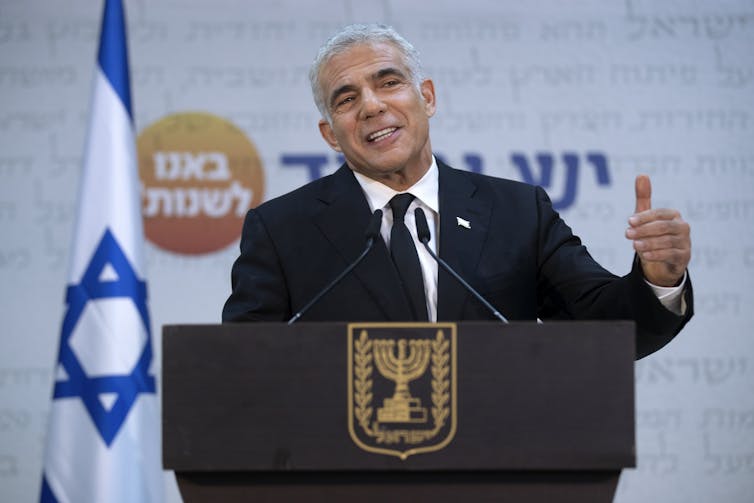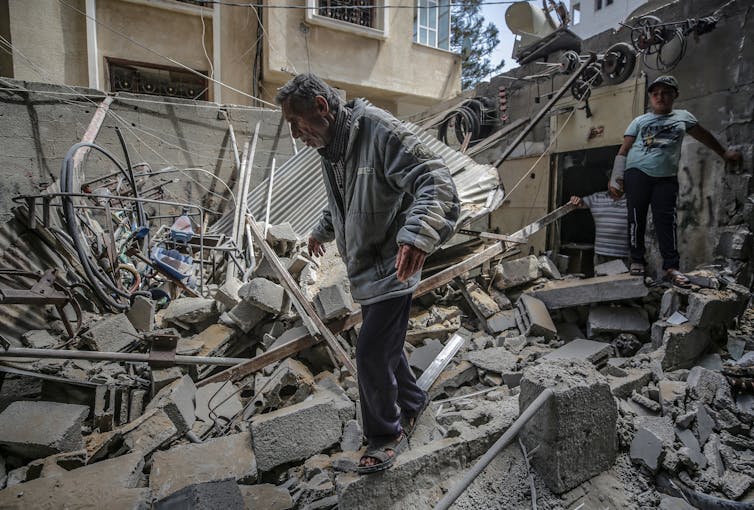Benjamin Netanyahu was on the brink of political defeat. Then, another conflict broke out in Gaza
- Written by Ran Porat, Affiliate Researcher, The Australian Centre for Jewish Civilisation, Monash University
Despite some conspiratorial claims to the contrary, long-serving Israeli Prime Minister Benjamin Netanyahu was not looking or hoping for a major conflict with the Palestinians to help him hold onto power.
To the contrary, over the past few years he has attempted to soothe Hamas, which has been designated a terrorist organisation by Israel, the US, European Union and other powers. While warning Hamas not to test Israel’s resolve, Netanyahu never tried to remove it from power in Gaza.
Instead, he made sure Israel maintained the set of unofficial agreements with Hamas (known in Hebrew as “hasdarah”) that have led to relative quiet. Netanyahu also allowed Qatar to transfer money to Gazans for infrastructure projects and, until the recent conflict broke out, limited the Israel Defence Force’s responses to the never-ending trickle of rockets fired from Gaza.
As tensions started escalating in Jerusalem in recent weeks, Netanyahu even warned his political ally, extremist national religious leader Itamar Ben Gvir, that his provocative makeshift “parliamentary office” in the flashpoint neighbourhood of Sheikh Jarrah could result in rockets from Gaza.
It is true that before the current outbreak of violence, Netanyahu’s political future was looking very bleak. He was unable to form a coalition after the March 23 election, when he failed for the fourth time in two years to garner enough votes for his party, Likud, and allied right-wing and ultra-Orthodox parties.
An ideologically diverse group of parties opposing Netanyahu — the no-Bibi camp — looked to be progressing slowly but surely towards a government supported by Ra’am (United Arab List), a conservative Islamist Arab party.
 Yair Lapid, Israel’s opposition leader, has criticised the government’s handling of the conflict.
Oded Balilty/AP
Yair Lapid, Israel’s opposition leader, has criticised the government’s handling of the conflict.
Oded Balilty/AP
But the massive rocket barrages from Gaza — along with the Israeli airstrikes and mob violence that ensued in several Israeli cities — pushed the already fragile relations between the Zionist and non-Zionist elements of the no-Bibi camp past the point of no return.
While Ra’am leader Mansour Abbas has called for reconciliation and sought continued coalition discussions to support a no-Bibi governing coalition, others in his party pushed for a negotiations freeze.
The final straw for the no-Bibi camp’s hopes was the decision by the head of the right-wing Yamina party, Naftali Bennett, to back away from a Ra’am-supported government.
Yamina immediately resumed consultations with the Likud, and Netanyahu will now try and win over Ra’am and/or persuade a few parliament members in the no-Bibi camp to defect to his ranks. On the other side, leader of the no-Bibi camp is still trying to at least block Netanyahu’s attempts at forming a government.
At this stage, another round of elections is a likely outcome.
Rallying behind Bibi (and Gantz)
And so it happened the conflict has played into Netanyahu’s hand. Being the seasoned and skilled politician he is, Netanyahu is certain to manoeuvre the changed political situation for his own benefit.
In times of war and instability, the Israeli public tends to rally behind a strong leader. Netanyahu is projecting such an image when he promises Hamas will pay a huge price for attacking Israel.
Read more: When it comes to media reporting on Israel-Palestine, there is nowhere to hide
Both Netanyahu and his defence minister, former coalition partner and bitter rival Benny Gantz, gave the Israel Defence Forces (IDF) the green light to execute a detailed and extensive attack plan that has been years in the making.
Militarily speaking, the army’s tactics have been resoundingly successful. Many high- to mid-level commanders of Hamas and the Palestinian Islamic Jihad (PIJ) group have been eliminated. Widespread damage has also been done to Hamas’ attack tunnels, weapons depots, naval forces, bases and more.
Casualties on the Israeli side have been relatively low, thanks to the Iron Dome defence system intercepting 90% of rockets from Gaza. The cost to the Palestinians due to the disparity in power between the two sides, however, has been tremendous. More than 200 people have died, including women and children, and there has been wide-scale destruction of houses, services and infrastructure.
 The UN says 72,000 people have been displaced in Gaza during the current fighting.
HAITHAM IMAD/EPA
The UN says 72,000 people have been displaced in Gaza during the current fighting.
HAITHAM IMAD/EPA
The Zionist Israeli public are cheering the IDF, with the expectation the campaign will leave Hamas reluctant to initiate another round of conflict anytime soon. Many of Israel’s Arab citizens — about 20% of the population — on the other hand strongly protested against the military operation in Gaza.
Netanyahu’s staying power is also partially explained by the rightward shift among many Israelis in recent years, fuelled by their disillusionment over the perceived failure of the Oslo peace process.
Many believe the bold attempt at peace went down in smoke in the second intifada in the early 2000s, when terrorists from various Palestinian factions committed suicide bombings of a previously unthinkable scale, killing more than a thousand Israelis. More than 3,000 Palestinians were also killed in the violence.
No end game in sight
Despite a ceasefire, the tragedy is neither side presents an end game to work towards. Israel’s next government will likely be right-wing, either under Netanyahu or someone else. Over the past few decades, such governments have leaned towards managing, not resolving, the conflict.
On the Palestinian side, everyone is waiting for the chairman of the Palestinian Authority, 86-year-old Mahmoud Abbas, to exit the stage. Seen as increasingly corrupt and with no legitimacy to govern, he offers no vision for a solution of the conflict.
Read more: Israel elections: Netanyahu may hold on to power, but political paralysis will remain
Hamas, PIJ and their allies remain staunchly committed to fundamentalist religious ideologies that reject Israel’s right to exist, with zero willingness to compromise.
The best both sides may strive for is another set of precarious understandings on the limits of mutual harm. Gaza will need years and heavy investments to recuperate from the damage. Psychological wounds on both sides are deep and bleeding. Healing is a long way off.
Authors: Ran Porat, Affiliate Researcher, The Australian Centre for Jewish Civilisation, Monash University





